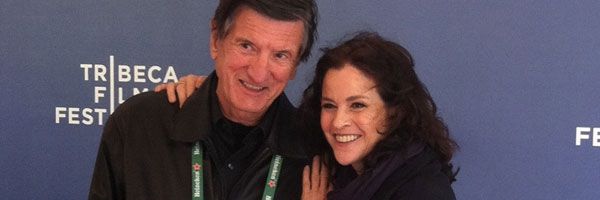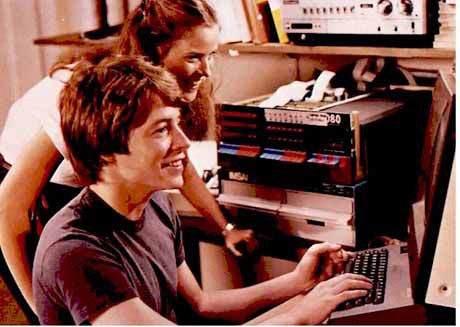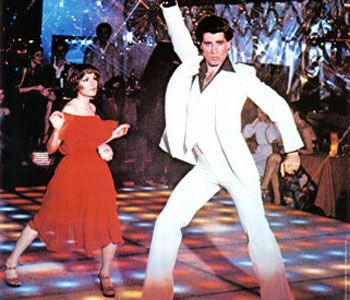WarGames left theaters nearly three decades ago, but a special screening and panel at The Tribeca Film Festival showed little erosion on its emotional impact or the immediacy of its ethical questions. The production wasn't easy on Its director, John Badham, who came in mid-shoot to right the production. Having not screened it for 15 years, the filmmaker had enough perspective to be able to truly enjoy his work. Hit the jump for our interview with Badham, including some pretty incredible backstory from the set, how he handled the controversial production, his thoughts on Seth Gordon's upcoming WarGames remake and why another of his classics, Saturday Night Fever, is still relevant.
John Badham's involvement with a cross-section of entertainment and the American military didn't start with WarGames. His father was a U.S. Army General and John was actually born in London, where the family was stationed, before they moved back, stateside, with a military transfer to Alabama. His mother, Mary Hewitt, was an actress and his sister, Mary, was actually nominated for a Best Supporting Actress Oscar at age 10 in 1963, for her portrayal of Scout in To Kill A Mockingbird.
Badham was a successful director in television when he got a big screen break in 1976 with The Bingo Long Traveling All-Stars & Motor Kings. The film starred Billy Dee Williams, James Earl Jones and Richard Pryor and focused on a barnstorming group of African-American baseball players in the 1930's. Badham followed it up with Saturday Night Fever, which made John Travolta a box office star and became a cultural touchstone that still defines the disco era. Work on Broadway and a big-screen version of Dracula ensued, before he got a call from the troubled set of WarGames.
The film starred two unknowns, Matthew Broderick and Ally Sheedy, and follows a teenage hacker, David Lightman (played by Broderick) who stumbles into a US Defense Department central computer. Lightman plays what he thinks is an innocent game of "Global Thermonuclear War" with a virtual counterpart, but his fictional attack on America, is believed to be very real by NORAD commanders and World War III becomes a very definite possibility.
On the set, director Martin Brest (Scent Of A Woman, Beverly Hills Cop) was fighting with producers over creative decisions and, after a two week negotiation, Badham was brought in to replace Brest. The new hire started on a Monday and was shooting three days later. He had already begun overhauling the script with the long-since replaced original screenwriters Lawrence Lasker (Sneakers) and Walter Parkes (who would become a major film producer, including a long-standing collaboration with Steven Spielberg). Badham quickly won over Broderick and Sheedy, who had feared for their jobs, and eventually, American audiences. Box office and critical success followed, along with three Oscar nominations for the film (including one for the fully revamped screenplay).
Badham has the gracious demeanor of someone who's gained a reputation as an actor's director and the patience of a college professor. The latter makes sense, since he now heads the directing program in the Graduate Conservatory at Chapman University. We started our conversation with his last viewing of the American classic he came in to save.
Click here for the audio or read on for the transcript.
Collider: When was the last time you had seen WarGames?
John Badham: Oh gosh. It's gotta be 15 years. Probably a, a television version that we had to make [to format the film for air on broadcast TV] so I had to look at it to shorten it down a little bit, but to get to see it like this on a big screen is beautiful. Forget all the problems that you had with it and, and now you get to see it as a proper film. By the time you finish working on a film, you're just, you can't see the details anymore. You're it's just like the surf washing over you. And so to be able to walk away from it for a long time, come back and go, "Oh, that's good. Oh, no. Why did I do that?" You see the, the mistakes and the good things and the happy accidents, and-
What are some happy accidents?
Badham: Oh, just the contributions. There's a line toward the end of the movie that General Beringer, who's in charge of NORAD says, as Matthew Broderick is trying to get up to the computer to see if he can stop it. And everybody is keeping Matthew's character away from everything. And I said, "How's he gonna up there?" Well, the General would let him up there and so I said to Barry Corbin [who played the General], what can we say to him that, you know, would kind of give him permission, 'cause you're the boss in here. And he said, "Oh, I'll think about it." And then, I forgot. And now we're shooting a take and I suddenly hear him say, "Good God. I'd piss on a spark plug if it'd help any. Get that boy up there!" And you go, "Ah, that's great." You know, true Lubbock, Texas-style. You know, when, when you're working well with actors and they start bringing ideas like that and contributions, it just makes it so much richer.
What is it about the themes of this film that you think, what lessons are we passing on, especially, in terms of warfare, in the 30 years, since?
Badham: Well, I don't know. This is one of the world's oldest messages and you keep hammering away at it and it's hard to get through which is, there's no point to this. This doesn't make any sense, and I think we will always be faced with that problem. Having lived through World War II and listened to, you know, people trying to get that war out of the way, listening to the Beatles, you know, talking about peace or the Vietnam protests and so on, you know there's always people who say, "This is just insane, what's going on." And yet, when you have people attacking you, as in 9/11, it's like, what are you gonna do? You can't lie down. You have to do something, but that doesn't make it less insane.
You talked about the troubles that you had, at the panel, with the process that you got in on a Monday and started on a Thursday, shooting.
Badham: Yes.
How soon can you make those changes, the wholesale changes to be able to [get a workable screenplay]? What was that experience like?
Badham: Well, I was fortunate enough to have had the negotiation process go on for a couple of weeks. I heard about it, like, two weeks before that and the agents and producers were kind of fighting over a deal. Meanwhile, they kept on shooting on the film and I said, "Well, I'm not going to sit here, waiting for something to get done. I'm going to, you know, work on the script myself and so I did and then, when I could get hold of the two [writers] Larry Lasker and Walter Parkes, I brought them in, and we made a lot of dialogue changes and structural changes, along the way, and they kept working on it while we were shooting. So, that if we start at 7:30 in the morning, you know, they'd show up at 7:30, sometimes 7:45 or 8:00 with new dialogue for the day, and, of course, being young as they are, Matt and Ally just absorbed that stuff like sponges and can (makes a vacuum-like sound). You know, whereas I would never be able to remember all those changes, so quickly. They were very helpful, but we just, kind of, kept hanging in there.
I talked to Ally (Sheedy) about the remake that Seth Gordon is directing.
Badham: Yes.
Noah Oppenheim is writing, who's a very serious writer. She said that it would be great to cast unknowns again, as the two leads. What are your thoughts on the remake, in terms of not just the casting, but updating it and--
Badham: The real trick would be to find something that is as groundbreaking as it was, in terms of the idea. I mean nobody wants another computer hacker movie, unless it's something amazingly different. I mean, this looks so, relatively, so far in the future. Not because of me, but because of Lasker and Parkes that the movie studios said, "Nah, nobody wants this. This is a bunch of kids here. This is nothing serious." You know? They just poo-pood it. Well, you need to be able to poo-poo because the idea is so far out. And if it just sounds too familiar, then that's how it's gonna be to the audiences, too. You know… (Badham mock yawns) "Yawn. Didn't we see this already." So, there has been one other sequel to WarGames that went straight to video (2008's War Games: The Dead Code). And it was, just… not… Well that's the reason things go straight to video. (Laughs)
[Is your take on a remake] leave well enough alone or great, have a new, you know, generation have a go at it?
Badham: If they're able to do it. Great. If they're able to do it and, yes, brand new cast, great.
Do you have any- Would you say, "Oh, I would cast this person, or not?
Badham: Oh, no. You'd have to start from scratch. Nobody knew who Matthew was. He had done one movie (Max Dugan Returns) and Ally had done one movie (Bad Boys) that, not kind of in the background, but, you know, not carrying the movie and, and that's part of the freshness of it, too.
And last question. One of your other films that still resonates is Saturday Night Fever. In fact, Glee just used "Saturday Night Fever."
Badham: (Smiling) I heard. I heard.
-- as a metaphor for going for your dreams and actually, put [a screening of the film] into the episode. What are your thoughts on how much that film, and why do you think that film resonates?
Badham: It's a tribute to Norman Wexler, who's the writer who managed to create characters and situations that we really tied into. The music is brilliant and the dancing is wonderful and that really kind of sells it, so that it's not just Mean Streets, which is wonderful by itself and was a great inspiration for me, Mean Streets. So, you've got these great characters and situations that you really tie into and this fabulous music and dancing, but when people tried to copy it later they thought all we need is the great music and dancing, and it'll be good. Like, Thank God It's Friday (the 1978 film won a Best Original Song Oscar for the disco classic "Last Dance" and had a cast that featured: Donna Summer, Jeff Goldblum and Debra Winger) and lots of different films, but they didn't have that foundation that we were blessed with, with the characters in that particular script, which is what, you know, went unsung, forever. You know, you see the whipped cream on top. Now, I hear people coming to me, saying, "You know, I hadn't seen that movie for 20 years or 25 years. Gosh, I didn't realize there was so much to it!" 'Cause, you know, going to see it the first time, you walk out, you know, singing and dancing.
Yeah. Well, I appreciate your time.
Badham: Ok, Thank you.
Thank you.



